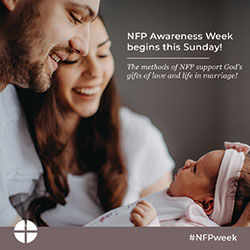Fall 2021 Marriage Supplement
How Natural Family Planning changed my life

(Graphic courtesy of the United States Conference of Catholic Bishops)
LBy Dawn Farias (Special to The Criterion)
As a child I was baptized Catholic, but essentially grew up with no religious practice. As a married adult, I re-entered the Church, and soon after felt a tugging at my heart to stop practicing contraception. At that time, I did not know about Natural Family Planning (NFP).
More basic, I did not know about Church teachings on the moral practice of family planning.
What I would learn about God’s design for my married life and through the practice of NFP would change my life.
True freedom and openness to life
When my husband, Ariel and I took an NFP class, I have to admit that I was scared.
Giving up control was frightening! It was one thing to be committed to an ideal, but something quite different to follow through on it. It definitely involved a leap of faith! Over time and with some experience, I began to appreciate the gift and beauty of NFP.
In practicing NFP, my husband and I must decide if we, as a couple, are ready to embrace the possibility of a new life in each menstrual cycle. When we had used contraception, we ignored this reality. With NFP we could not ignore how God made us—as a man and a woman.
NFP helped us understand the relationship that God designed between the marital act and procreation. It has made us “open to life.” It even brought our last two children into the family!
The gift of self
In using NFP over the years, both my husband and I now see that we give ourselves to each other fully in the marital act. For us, the idea of contraception has become almost vulgar. It cheapens the marital act. Contraception seems to say: “I love you, honey, but I don’t love you THAT much.”
NFP also guards against the objectification of the woman in the relationship.
Contraception often keeps the woman in a defensive position because it allows “intimacy on demand.” NFP does not allow this because of the practice of periodic abstinence when not seeking a pregnancy. A deeper equality between husband and wife can be nurtured with NFP. NFP begins the process of this awareness.
Growing together in holiness
The sacrifices that NFP entails have only served to make me a better person and more devoted to the Lord. Without knowing it, using contraception promotes the idea that children are a burden.
Children do require lots of work, and pregnancy demands its own set of sacrifices, but NFP has helped me meet these challenges by leading me to the realization that children are God’s blessings. I am constantly forced to pray, change, make concessions and find solutions to the selfishness and laziness that come up often when meeting the needs of others.
Today, I am confident that had I not been open to life in the practice of NFP, I would not have needed to depend on God, and not have grown as a person. This growth benefits my family and the people I meet in everyday life.
Jesus calls us to serve others. Marriage and parenthood are ways we can immediately apply this call in our lives. NFP has led me to be more open to life, more aware of God’s design for intimacy in marriage, more dependent on him to fulfill these plans. It has strengthened my relationship with my husband, given me personal insight, and it has given our children life!
(Dawn and her husband Ariel Farias have four children and live in the Archdiocese of San Antonio. Farias, Dawn, “How Natural Family Planning Changed My Life,” NFPP/US Conference of Catholic Bishops, Washington, DC: USCCB, 2011. Used with permission.) †
See more from our Fall 2021 Marriage Supplement
